
Article describes work and personal management techniques to help achieve work-life-balance
- Subject:
- Career and Technical Education
- Material Type:
- Reading
- Reference Material
- Author:
- David Lavenda
- Date Added:
- 05/23/2018

Article describes work and personal management techniques to help achieve work-life-balance
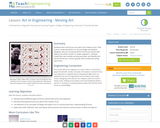
Students learn how forces are used in the creation of art. They come to understand that it is not just bridge and airplane designers who are concerned about how forces interact with objects, but artists as well. As "paper engineers," students create their own mobiles and pop-up books, and identify and use the forces (air currents, gravity, hand movement) acting upon them.
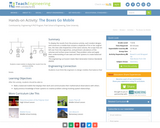
To display the results from the previous activity, each student designs and constructs a mobile that contains a duplicate of his or her original box, the new cube-shaped box of the same volume, the scraps that are left over from the original box, and pertinent calculations of the volumes and surface areas involved. They problem solve and apply their understanding of see-saws and lever systems to create balanced mobiles.
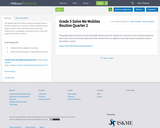
This google slide show will be used by third grade teachers with their students as a numeracy routine. Students should be given time to notice and wonder about each slide. Students then use algebraic reasoning to discuss what each shape in the mobile is "worth".
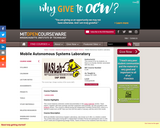
MASLab (Mobile Autonomous System Laboratory) is a robotics contest. The contest takes place during MIT's Independent Activities Period and participants earn 6 units of P/F credit and 6 Engineering Design Points. Teams of three to four students have less than a month to build and program sophisticated robots which must explore an unknown playing field and perform a series of tasks. MASLab provides a significantly more difficult robotics problem than many other university-level robotics contests. Although students know the general size, shape, and color of the floors and walls, the students do not know the exact layout of the playing field. In addition, MASLab robots are completely autonomous, or in other words, the robots operate, calculate, and plan without human intervention. Finally, MASLab is one of the few robotics contests in the country to use a vision based robotics problem.
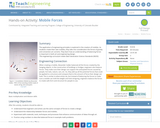
The application of engineering principles is explored in the creation of mobiles. As students create their own mobiles, they take into consideration the forces of gravity and convection air currents. They learn how an understanding of balancing forces is important in both art and engineering design.
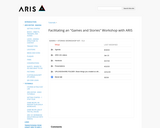
Are you interested in learning how to create (or have your students create) educational board games and mobile-based interactive stories and games? This collection of schedules, presentations, handouts and prototyping tools will get you off to a great start.
In this workshop, learners will:
-Learn about the Learning Science behind educational games
-Learn the process of designing analog educational games
-Learn how to use ARIS, a user-friendly, open-source platform for creating and playing mobile games, tours and interactive stories.
-Use ARIS to create a location-based story or game